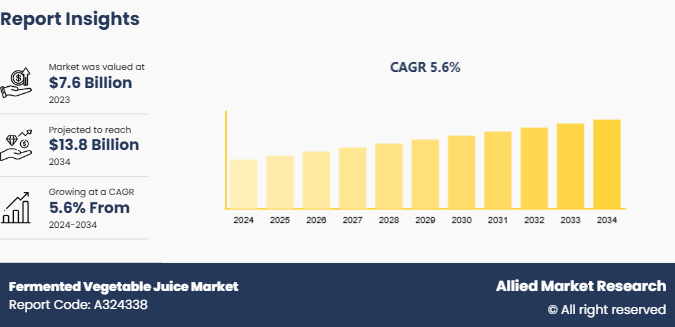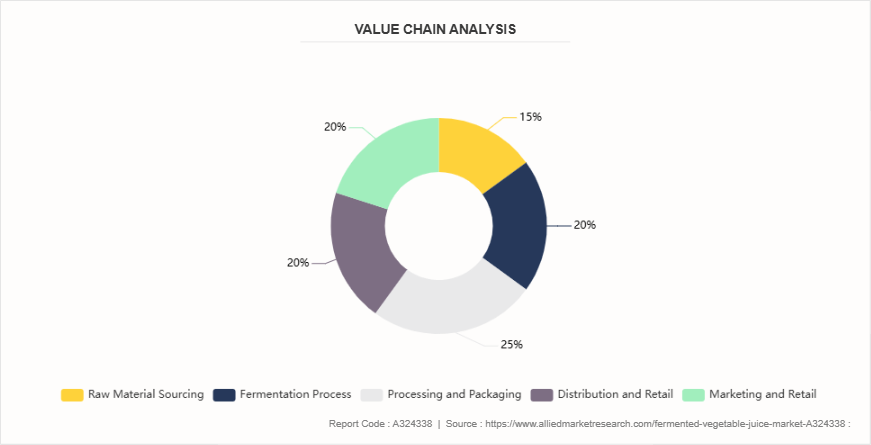Fermented Vegetable Juice Market Research, 2034
Market Introduction and Definition
The global fermented vegetable juice market size was valued at $7.6 billion in 2023, and is projected to reach $13.8 billion by 2034, growing at a CAGR of 5.6% from 2024 to 2034. Fermented vegetable juice is a nutrient-rich beverage produced through the natural fermentation of vegetables with beneficial microorganisms such as lactic acid bacteria. This process not only enhances the flavor but also increases the nutritional value of the juice by boosting probiotic content, aiding digestion, and supporting gut health. Vegetables used for fermentation include carrots, beets, tomatoes, and cabbages. Fermented vegetable juices are increasingly sought after for their health benefits, including ability to enhance the immune system and promote overall well-being. It is used as standalone beverages, dietary supplements, or culinary ingredients in food preparations.

Key Takeaways
- The fermented vegetable juice market study covers 20 countries. The research includes a segment analysis of each country in terms of value for the forecast period.
- More than 1, 500 product literatures, industry releases, annual reports, and other such documents of major fermented vegetable juice industry participants along with authentic industry journals, trade associations' releases, and government websites have been reviewed for generating high-value industry insights.
- The study on fermented vegetable juice market integrated high-quality data, professional opinions and analysis, and critical independent perspectives. The research approach is intended to provide a balanced view of global markets and to assist stakeholders in making educated decisions in order to achieve their most ambitious growth objectives.
Key market dynamics
- Rise in prevalence of lifestyle-related diseases, coupled with increase in awareness of gut health and the benefits of probiotics, drives fermented vegetable juice market growth. Consumers increasingly view these juices as natural solutions for improving digestion, boosting immunity, and enhancing overall health.
- The global shift toward vegan and plant-based diets has created a strong market for fermented vegetable juice. As consumers move away from animal-based products, they are actively seeking plant-based alternatives that provide similar nutritional benefits. Fermented vegetable juices fit seamlessly into vegan lifestyles by offering a rich source of essential nutrients, probiotics, and antioxidants without any animal-derived ingredients.
- With rise in awareness of the adverse effects of excessive sugar and calorie consumption, consumers are preferring healthier beverage alternatives. Fermented vegetable juices, known for their naturally low sugar content and minimal calories, cater perfectly to this demand. Unlike traditional sugary drinks, these juices derive their flavor from natural fermentation processes and vegetables, making them an attractive choice for individuals aiming to reduce sugar intake while maintaining flavorful options. This trend is particularly significant among consumers with conditions such as diabetes, obesity, and heart disease, who are actively choosing beverages aligned with their dietary restrictions which expected to boost fermented vegetable juice market demand.

Value Chain Analysis
Each stage in the value chain contributes to the overall value of fermented vegetable juice and influences factors such as pricing, quality, and customer satisfaction. Analyzing each step helps identify areas for improvement and opportunities for innovation in the market.
Raw Material Sourcing:
The process begins with sourcing high-quality raw materials, primarily fresh vegetables like carrots, beets, cucumbers, and leafy greens. Organic and locally sourced ingredients are gaining importance due to consumer preferences for sustainable and pesticide-free produce.
Fermentation Process:
In this stage, raw vegetables undergo preparation, which includes washing, peeling, chopping, and juicing. The juice is then fermented using natural cultures or added probiotics to enhance its nutritional profile and flavor. This step requires precision in maintaining fermentation conditions, such as temperature, pH levels, and hygiene standards, to ensure consistent product quality.
Processing and Packaging:
Proper packaging is vital to maintain the integrity and shelf life of fermented vegetable juice. Manufacturers use eco-friendly materials, like glass bottles or recyclable plastics, to appeal to environmentally conscious consumers. The packaging must also prevent contamination and preserve the probiotics and nutrients.
Distribution and Retail:
Efficient distribution channels are necessary to ensure the timely availability of fermented vegetable juice. Distribution networks typically involve wholesalers, distributors, and logistics partners who transport the product to various retail and online platforms.
Marketing and Retail
In this stage, manufacturers and retailers focus on branding and consumer outreach. Emphasis is placed on promoting the health benefits of fermented vegetable juice, such as gut health and immunity support, through digital marketing, influencer collaborations, and in-store promotions.
Market Segmentation
The fermented vegetable juice market is segmented into product type, flavor, distribution channel, and region. By product type, the market is segmented into kimchi, sauerkraut, kombucha, pickled juice, and others. By flavor, the market is classified into plain/unflavored and flavored. By distribution channel, the market is segmented into hypermarkets and supermarkets, specialty stores, convenience stores, online retail, and others. Region-, wise, the market is analyzed across North America, Europe, Asia-Pacific, and LAMEA.
Regional Market Outlook
North America holds a major fermented vegetable juice market share in 2023, owing to rise in health consciousness and demand for healthy beverages. The U.S. leads the market, with strong demand from health-conscious consumers and the growing trend of incorporating functional beverages into daily diets. Retail chains and health food stores prominently feature fermented juices, supported by innovation in product offerings which are expected to propel the growth of the fermented vegetable juice market.
Industry Trends
- Rise in demand for functional and probiotic-rich beverages is a major trend driving the fermented vegetable juice market. Consumers increasingly prefer products that combine health benefits with convenience, propelling the popularity of fermented vegetable juices as natural sources of probiotics.
- Consumers are shifting toward clean-label, non-GMO, and organic products. Fermented vegetable juice manufacturers are responding by offering beverages made from organically sourced vegetables with no artificial additives, aligning with consumer preferences for sustainable and natural food products which is expected to propel growth during fermented vegetable juice market forecast.
- Companies are introducing diverse flavor combinations and fortifying fermented vegetable juices with vitamins, minerals, and herbal extracts to cater to a broader consumer base. Examples include blends of carrot-ginger juice and beet-turmeric juice, targeting both taste and health-conscious consumers.
Competitive Landscape
The major players operating in the fermented vegetable juice market include Biotta, Suja Life, LLC, Wildbrine, The Brinery, Vitamont, Rizo Bros Fermenteria, Oh So Good Fermented Vegetable Juice, Kiju Organic, Health-Ade, and Rejuvenation Company.
Key Benefits For Stakeholders
- This report provides a quantitative analysis of the market segments, current trends, estimations, and dynamics of the fermented vegetable juice market analysis from 2024 to 2034 to identify the prevailing fermented vegetable juice market opportunities.
- The market research is offered along with information related to key drivers, restraints, and opportunities.
- Porter's five forces analysis highlights the potency of buyers and suppliers to enable stakeholders make profit-oriented business decisions and strengthen their supplier-buyer network.
- In-depth analysis of the fermented vegetable juice market segmentation assists to determine the prevailing market opportunities.
- Major countries in each region are mapped according to their revenue contribution to the global market.
- Market player positioning facilitates benchmarking and provides a clear understanding of the present position of the market players.
- The report includes the analysis of the regional as well as global fermented vegetable juice market trends, key players, market segments, application areas, and market growth strategies.
Fermented Vegetable Juice Market Report Highlights
| Aspects | Details |
| Market Size By 2034 | USD 13.8 Billion |
| Growth Rate | CAGR of 5.6% |
| Forecast period | 2024 - 2034 |
| Report Pages | 310 |
| By Product Type |
|
| By Flavor |
|
| By Distribution Channel |
|
| By Region |
|
| Key Market Players | Kiju Organic, The Brinery, Suja Life, LLC, Oh So Good Fermented Vegetable Juice, Vitamont, Biotta, Rejuvenation Company, Wildbrine, Health-Ade, Rizo Bros Fermenteria |
The global fermented vegetable juice market was valued at $7.6 billion in 2023, and is projected to reach $13.8 billion by 2034, growing at a CAGR of 5.6% from 2024 to 2034.
The fermented vegetable juice market is segmented into product type, flavor, distribution channel, and region. By product type, the market is segmented into kimchi, sauerkraut, kombucha, pickled juice, and others. By flavor, the market is classified into plain/unflavored and flavored. By distribution channel, the market is segmented into hypermarkets and supermarkets, specialty stores, convenience stores, online retail, and others. Region wise, the market is analyzed across North America, Europe
North America is the largest regional market for fermented vegetable juice
The major players operating in the fermented vegetable juice market include Biotta, Suja Life, LLC, Wildbrine, The Brinery, Vitamont, Rizo Bros Fermenteria, Oh So Good Fermented Vegetable Juice, Kiju Organic, Health-Ade, and Rejuvenation Company.
The global fermented vegetable juice market report is available on request on the website of Allied Market Research.
Loading Table Of Content...



